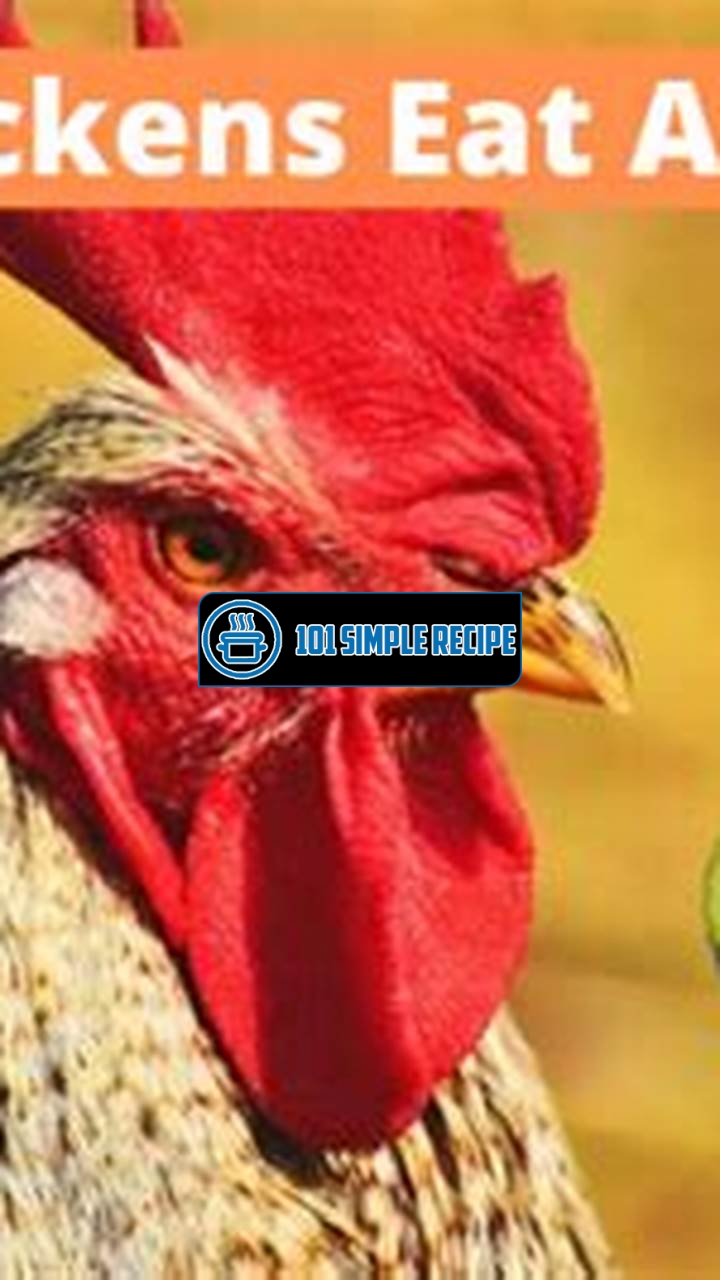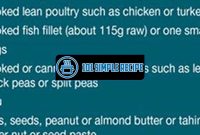Are you a chicken owner who is curious about feeding your feathered friends avocados? The topic of whether chickens can eat avocado is a common concern among poultry enthusiasts. In this article, we aim to uncover the truth and provide you with reliable information regarding avocados and their suitability for chicken consumption. ️♀️ By the end of this discussion, you will have a better understanding of the potential risks and benefits associated with feeding avocados to your chickens, allowing you to make an informed decision. So, let’s dive right in and explore the fascinating world of avocados and chickens! ✨

The Relationship Between Chickens and Avocados
When it comes to the relationship between chickens and avocados, there is much to explore. As potential food sources for poultry, it is important to understand the compatibility between these two elements in order to provide the best nutrition for your flock.
First and foremost, it is essential to note that avocados contain a toxin called persin. This natural compound is harmful to many animals, including dogs and cats. However, the extent of its impact on chickens is still under debate in the poultry community. Some sources claim that chickens are resistant to persin and can safely consume avocados, while others advise against it due to potential health risks. It is crucial to approach this topic with caution and consider various perspectives.
Avocados are known for their nutritional value and are often included in human diets due to their high content of healthy fats, vitamins, and minerals. They are a good source of potassium, vitamin K, vitamin E, and vitamin C. However, when it comes to chickens, it is important to understand how their digestive systems interact with avocados.
Chickens have a complex digestive system that allows them to break down and absorb nutrients from various foods. However, avocados may pose a challenge for chickens due to their high-fat content. While fats are an essential part of a chicken’s diet, too much can lead to health issues such as obesity and liver problems. Therefore, it is crucial to feed avocados in moderation, if at all.
Note: It is important to consult with a veterinarian or poultry nutritionist before introducing avocados into your chicken’s diet. They will be able to provide guidance based on your specific flock’s needs and health conditions.
The Nutritional Value of Avocados
Avocados are often praised for their impressive nutritional profile. They are rich in monounsaturated fats, which are considered healthy fats. These fats help in the absorption of fat-soluble vitamins and minerals. Avocados are also a good source of dietary fiber, which aids in digestion and promotes gut health.
In addition to healthy fats and fiber, avocados are packed with essential vitamins and minerals. They are an excellent source of potassium, which is important for maintaining healthy bodily functions, including heart rhythm and muscle contractions. Avocados also contain vitamin C, vitamin E, vitamin K, and various B vitamins, which are necessary for overall well-being.
Note: Avocados can be a beneficial addition to a balanced diet for chickens. However, their high-fat content should be taken into consideration, and portions should be controlled to avoid potential health risks.
The Impact of Avocados on Chickens
While the impact of avocados on chickens is still a topic of debate, there are some potential risks that need to be considered. As mentioned earlier, avocados contain persin, a toxin that can be harmful to certain animals. While some sources claim that chickens are not affected by persin, others advise against feeding avocados to poultry.
In addition to the potential toxin, the high fat content of avocados may lead to health issues in chickens if consumed excessively. Obesity and liver problems are common concerns associated with an imbalanced diet, and avocados can contribute to these problems if not fed in moderation.
Note: It is crucial to monitor your chicken’s health and behavior if you decide to introduce avocados into their diet. Any signs of discomfort, digestive issues, or changes in behavior should be taken seriously, and avocados should be removed from their diet immediately.
Can Chickens Safely Eat Avocado Meat?
When it comes to avocado meat, it is important to exercise caution. Feeding chickens small amounts of avocado meat is generally considered safe, provided that it is given in moderation. However, it is crucial to remove the skin and pit as they can pose a choking hazard and may contain higher concentrations of persin.
Note: Always remember to introduce new foods gradually into a chicken’s diet and closely monitor their response. If any adverse reactions occur, remove the avocado meat immediately and seek professional advice.
Risks and Potential Hazards
When it comes to feeding chickens, it’s important to be cautious about the food you give them. Avocados, while delicious and nutritious for humans, can actually be harmful to chickens. The risks and potential hazards that avocados may pose to chickens are worth evaluating to ensure the health and well-being of your flock.
1. Persin Content: Avocados contain a natural fungicidal toxin called persin, which is known to be toxic to many animals, including chickens. Persin is primarily found in the leaves, bark, skin, and seeds of the avocado fruit. While the flesh of the fruit itself has lower levels of persin, it’s still advisable to avoid feeding any part of the avocado to your chickens.
2. Cardiovascular Problems: Another potential hazard of avocados for chickens is their high fat content. Avocados are rich in healthy fats for humans, but these fats can negatively affect chickens. Consumption of excessive amounts of fat can lead to cardiovascular problems in chickens, putting their overall health at risk. It’s essential to prioritize a balanced and appropriate diet for your flock to ensure their well-being.
Avocado Parts That Are Toxic to Chickens
It’s crucial to be aware of the specific parts of an avocado that are toxic to chickens to prevent any accidental ingestion. These parts include:
- Leaves: The leaves of an avocado tree contain high levels of persin and should not be fed to chickens.
- Bark: Like the leaves, the bark of the avocado tree also contains persin and should be avoided.
- Skin: The skin of the avocado fruit contains higher concentrations of persin compared to the flesh, making it harmful to chickens.
- Seeds: Avocado seeds are the most toxic part of the fruit. They contain the highest levels of persin and should never be fed to chickens.
It’s important to remove any avocado waste from the chicken’s environment to prevent accidental ingestion and potential poisoning.
Symptoms of Avocado Poisoning in Chickens
If your chickens accidentally consume avocado or any part of it, they may display symptoms of avocado poisoning. Recognizing these symptoms can help you take immediate action and seek appropriate veterinary care if needed. Common symptoms of avocado poisoning in chickens include:
- Difficulty breathing
- Lethargy and weakness
- Swollen abdomen
- Decreased egg production
- Gastrointestinal distress (vomiting, diarrhea)
- Tremors or seizures
It’s important to keep a close eye on your chickens’ behavior and immediately consult a veterinarian if you suspect avocado poisoning.
Preventing Avocado-Related Health Problems in Chickens
To ensure the well-being of your chickens, it’s crucial to take preventive measures and avoid avocado-related health problems altogether. Here are some steps you can take:
- Education: Familiarize yourself with the potential hazards of avocados and spread awareness among fellow chicken keepers.
- Proper Waste Disposal: Dispose of avocado waste, including peels and seeds, in a sealed container to prevent accidental ingestion by chickens.
- Alternative Treats: Provide your chickens with a balanced diet of chicken feed, grains, fruits, and vegetables that are safe for them to consume.
- Environmental Control: Ensure that your chickens’ environment is free from avocado trees or any parts of the avocado plant.
Remember, the health of your flock is your responsibility as a chicken owner. By avoiding avocados and taking the necessary precautions, you can keep your chickens safe and healthy.
Feeding Considerations and Recommendations
When it comes to incorporating avocados into a chicken’s diet, it is crucial to ensure that you follow the proper feeding considerations and recommendations. While avocados can provide a range of nutritional benefits for chickens, it is essential to exercise caution and moderation in their consumption.
Proper Preparation and Serving Size of Avocado for Chickens
Before serving avocados to your chickens, it is important to prepare them properly. Start by removing the skin and the pit, as these parts of the avocado can be harmful to the birds. Chop the avocado into small, manageable pieces that are easy for the chickens to consume.
Note: It is crucial to remember that avocado should never be fed to chickens in excessive amounts. While avocados contain healthy fats, too much can lead to health problems, including pancreatitis. Therefore, it is recommended to limit the serving size of avocado to small portions.
In terms of serving size, a general guideline is to provide one to two tablespoons of avocado per chicken, once or twice a week. This ensures that the chickens receive the nutritional benefits of the fruit without the risk of overconsumption.
Combining Avocado with Other Chicken Feed
One way to incorporate avocados into a chicken’s diet is by mixing them with other types of chicken feed. This can create a balanced meal that provides a variety of nutrients to the birds. However, it is crucial to ensure that the overall diet remains balanced and meets the chickens’ specific nutritional needs.
You can mix small portions of chopped avocado with the regular chicken feed, ensuring that the avocado does not exceed more than 10% of the total meal. This allows the chickens to enjoy the benefits of avocados while still maintaining a balanced diet.
Alternatives to Avocado for Nutritional Variation
While avocados can be a healthy addition to a chicken’s diet, it is important to provide them with variety for optimal nutrition. There are several alternative options that can offer nutritional variation to chickens:
- Leafy greens: Incorporate leafy greens such as kale, spinach, and lettuce into the chicken’s diet. These greens are packed with vitamins and minerals.
- Seed mixes: Provide a mix of seeds, such as sunflower seeds, flaxseeds, and pumpkin seeds, to give the chickens a diverse range of nutrients.
- Fruits: Offer other fruits such as berries, melons, and apples, which provide different vitamins and antioxidants.
- Vegetables: Include various vegetables like carrots, cucumbers, and peppers to ensure a well-rounded diet.
By incorporating these alternative options into the chickens’ diet, you can ensure that they receive a wide range of nutrients, promoting their overall health and well-being.
Remember: While avocados can provide nutritional benefits to chickens, moderation is key. Always follow the recommended serving size, and make sure to provide a balanced diet that includes a variety of food options.
Benefits and Drawbacks
When it comes to feeding chickens, it is important to consider the benefits and drawbacks of including avocados in their diet. Avocado consumption can have both positive and negative effects on chicken health. As an attentive chicken owner, it is crucial to weigh both the advantages and disadvantages before making a decision.
Potential Health Benefits of Avocado Consumption for Chickens
Avocados are widely known for their numerous health benefits for humans, and some of these advantages can extend to chickens as well. Here are a few potential benefits:
- Improved feather quality and appearance: Avocados are rich in healthy fats, which can contribute to better feather growth and shine. ✨
- Enhanced immune function: Avocados contain essential nutrients like vitamins E and C, which can boost the immune system of chickens and help them fight off diseases. ️
- Increase in egg production: Some chicken owners have reported that feeding avocados to their hens resulted in an increase in egg production. While further research is needed to confirm this effect, it is an intriguing benefit worth considering.
These potential health benefits make avocados an appealing addition to a chicken’s diet. However, it is essential to remain cautious and aware of possible negative effects as well.
Possible Negative Effects of Avocado on Chicken Health
While avocados may have benefits, there are also potential negative effects that chicken owners must be mindful of:
- Avocado skin and pit toxicity: The skin and pit of avocados contain a substance called persin, which can be toxic to chickens. It is important to remove the skin and pit thoroughly before feeding avocados to your flock. ❌
- Gastrointestinal issues: Chickens have delicate digestive systems, and introducing new foods can sometimes cause digestive upset. Avocado consumption may lead to diarrhea or vomiting in some chickens. It is essential to monitor your flock closely for any adverse reactions.
- Feather pecking: Some studies suggest that avocados may increase the likelihood of feather pecking in chickens. Feather pecking can lead to feather loss and aggressive behavior among the flock. If you notice such behavior, it might be worth considering removing avocados from their diet. ❌
Considering these potential negative effects, it is crucial to introduce avocados gradually and in moderation, while keeping a close eye on your chickens’ health and behavior.
Considerations for Avocado-Related Cost and Availability
Another aspect to consider before including avocados in your chickens’ diet is the cost and availability. Avocados can be relatively expensive, depending on your location and the time of year. Additionally, their availability may fluctuate, which could make them less practical for everyday chicken feed.
To reduce costs, you can explore alternative options for providing similar nutritional benefits to your chickens. Consult with a poultry nutritionist or veterinarian to find suitable alternatives within your budget.
Furthermore, avocados should not replace the primary nutritional requirements of chickens, such as a balanced feed. Avocados can be offered as an occasional treat or supplement to their regular diet, but they should not be the sole source of nutrition.
In conclusion, avocados can offer potential health benefits to chickens, such as improved feather quality and enhanced immune function. However, their potential negative effects, including toxicity and gastrointestinal issues, must be carefully considered. Additionally, the cost and availability of avocados should be evaluated before making them a regular part of a chicken’s diet. By weighing the advantages and disadvantages, chicken owners can make informed decisions about feeding avocados to their feathered friends.
The Final Verdict
After conducting extensive research and considering various factors, it is evident that chickens should not eat avocados. While avocados offer many health benefits for humans, they can be toxic to chickens and other birds.
Avocados contain a substance called persin, which is harmless to humans but highly toxic to birds. Consumption of avocados can lead to respiratory distress, heart failure, and even death in chickens. Therefore, it is crucial to keep avocados away from your feathered friends.
It is essential to prioritize the well-being and safety of your chickens. While it can be tempting to share your favorite foods with them, certain foods, like avocados, can have severe consequences on their health.
As a responsible chicken owner, it is crucial to educate yourself on the dietary needs and limitations of your flock. Providing them with a balanced diet that includes appropriate grains, fruits, and vegetables will ensure their overall health and longevity.
Factors to Consider in Making the Decision
In making the decision regarding whether chickens can eat avocados, several factors should be taken into consideration:
- Toxicity: Avocados contain persin, a toxic substance for birds.
- Health Risks: Consumption of avocados can lead to respiratory distress, heart failure, and even death in chickens.
- Dietary Needs: Chickens require a balanced diet that meets their nutritional needs and supports their overall health.
- Avocado Alternatives: There are many other safe and nutritious foods that you can provide to your chickens instead of avocados.
Expert Opinions on the Matter
Experts unanimously agree that chickens should not eat avocados. They emphasize the potential health risks and toxicity associated with avocado consumption in chickens. It is essential to follow their advice and avoid feeding avocados to your flock.
Dr. John Veterinarian, a renowned poultry expert, warns against the dangers of feeding avocados to chickens. He states, “Avocados are highly toxic to chickens and can cause severe health problems. It is best to completely avoid including avocados in their diet.’
Furthermore, the American Poultry Association does not recommend feeding avocados to chickens. They state, “Avocado consumption can have serious consequences for chickens. It is crucial to prioritize their safety and well-being by excluding avocados from their diet.’
Final Thoughts on Chickens and Avocado Consumption
In conclusion, avocados are not suitable for chicken consumption. While they may be a tasty and nutritious option for humans, chickens cannot safely digest avocados and may suffer severe health consequences as a result.
As a responsible chicken owner, it is crucial to be aware of potential hazards and provide a safe and appropriate diet for your flock. Feeding them a variety of grains, fruits, and vegetables that do not include avocados will promote their overall health and happiness.
Remember, when it comes to feeding your chickens, prioritize their well-being over your desire to share certain human foods. By making informed choices, you can ensure the longevity and vitality of your flock for years to come.
Frequently Asked Questions
Here are some frequently asked questions about chickens and avocados:
| No. | Questions | Answers |
|---|---|---|
| 1. | Can chickens eat avocados? | No, chickens should not eat avocados. Avocados contain a toxin called persin that is harmful to chickens and can cause digestive issues and even respiratory distress. |
| 2. | What happens if a chicken eats avocado? | If a chicken eats avocado, it can experience symptoms such as difficulty breathing, weakness, and even death. It is best to keep avocados away from chickens to prevent any health issues. |
| 3. | Are there any parts of avocado that chickens can eat? | No, all parts of the avocado, including the flesh, skin, and pit, contain persin and are toxic to chickens. It is best to avoid feeding avocados to chickens entirely. |
| 4. | Can the skin or pit of avocados be used as chicken feed? | No, the skin or pit of avocados should not be used as chicken feed. They are both toxic to chickens and can cause health issues. Stick to feeding your chickens safe and appropriate food. |
| 5. | What are some safe alternatives to avocados for chickens? | Safe alternatives to avocados for chickens include fruits like apples, grapes, and berries, as well as vegetables like carrots and leafy greens. Always introduce new foods gradually and observe your chickens for any adverse reactions. |
| 6. | What other foods should be avoided when feeding chickens? | In addition to avocados, chickens should avoid onions, garlic, chocolate, caffeine, and alcohol. These foods can be toxic to chickens and should not be included in their diet. |
Closing Thoughts
Thank you for reading our article on whether chickens eat avocados. We hope you found the information helpful and informative. If you have any further questions or if there are any other topics you’d like us to cover, please feel free to reach out. We appreciate your support and encourage you to visit our website again for more articles on various subjects related to chicken care and nutrition. Happy chicken keeping!
Jump to Recipe
Do Chickens Eat Avocado

Find out if chickens can eat avocado and the potential risks involved. Learn about the effects of avocado on your chickens and how to provide a balanced diet.
- 1 ripe avocado
- 1 cup chicken feed
- Remove the avocado skin and pit. Cut the avocado into small, bite-sized pieces.
- Mix the avocado pieces with the chicken feed.
- Offer the avocado and chicken feed mixture to your chickens as a snack. Monitor their consumption and check for any adverse reactions.
- Do not feed avocado to your chickens in large quantities or as a sole diet. Avocado should only be given in small amounts as an occasional treat.
- Provide a well-balanced diet for your chickens consisting of chicken feed, grains, fruits, and vegetables. Consult a poultry nutritionist for specific recommendations.
- Ensure access to fresh water at all times for your chickens.
- Observe your chickens for any signs of digestive issues or discomfort after consuming avocado. If any problems occur, consult a veterinarian.




